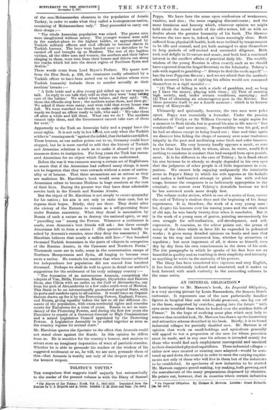TOLSTOY'S YOUTH.* Tim comparison that suggests itself unjustly but automatically
to the reader of the present volume is with the Diary of Samuel
• TAs Diaries of Iwo Toldoo: rose, Pd. A, 1547.185.2. Translated from the Hun= by C • J. liesarth and A. sthth. LaMar; I. )L Dud, and Sear. [San anti
Pepys. We have hem the same open confessions of weaknesses. vanities, and sins ; the same engaging discursiveness ; and the same frankness and honesty which, whatever opinion we might hold aboUt the moral worth of the older writer, left us with no doubts about the genuine humanity of his book. The likeness between the two men is, indeed, at times amazingly close. Both stiffered from physical ill-health, both were inclined by temperament to be idle and sensual, and yet both managed to spur themselves to long periods of self-control and successful diligence. Both took real delight in literature and music, and both hod a continual interest in the smallest affairs of practical daily life. The worldly wisdom of the young Russian is often exactly such as we should have expected from the frugal Secretary to the Admiralty. Tolstoy's rule with regard to gambling—." Always to deal the cards myself "- bas bas the true Popysian flavour ; and we are afraid that the methods which occurred to him of righting his affairs would not commend themselves to a rigid moralist :- " (1) That of falling in with a circle of gamblers, and, so long as I have the money, playing with them ; (2) That of entering high society, and, under certain conditions, marrying ; and (3) That of obtaining an advantageous post in the Service. But there presents itself to me a fourth measure which is to borrow money of Kireyevski."
Ultimately and spiritually, however, the two men were poles apart. Pepys was essentially a formaliat. Under the passing influence of Evelyn or Sir William Coventry he might aspire for a moment to Stoic ideals, but in general his aim in life was to " live comfortable " and save money. Respectability was his god, and ho had no shame except in being found out ; time and limo again we discover him licking the chops of memory over some traitorotra iniquity in the past and meditating some fresh and safer baseness in the future. His very honesty hardly appears a merit, as stare was he that his future Self, to whom, alone, lie wrote, would final nothing to condemn in conduct that had escaped from open punish. ment. It is far different in the case of Tolstoy ; he is frank about his sins because ho is already so deeply degraded in his own eyes that the judgment of other people is of little importance in com- parison. We cannot help enjoying malignantly the inimitable scene in Pcpys's Diary in which his wife appears at his bedsit') and makes a half-hearted attempt to pinch him with red-hot tongs, because the vengeance is so ludicrously appropriate to the criminal ; wo sorrow over Tolstoy's downfalls because we feel he has sorrowed much more deeply first.
The volume under review, which is one of a series of four, covers the end of Tolstoy's student days and the beginning of his Army experiences. It is, therefore, the work of a very young man for, despite his laments over his waning years and the swift onset of old age, he was barely twenty-four when it concludes- But it is the work of a young man of genius, painting unconsciously his own struggle for self-realization, self.development, and self- expression. It contains, as the editor points out, the germs of many of the ideas which in later life ho expanded in polemical works ; it gives many detailed opinions on books and men that came in his way and interested him, whether by attraction or repulsion ; but most important of all, it shows us himself, seen day by day from his own consciousness in the dawn of lain soul. The few paragraphs in which he speaks of his first love are as beautiful in quality and as touching in their simplicity and intensity as anything he wrote in the maturity of his powers.
The Diary has been translated into vigorous and racy English, it has been elaborately indexed and annotated, and it makes us look forward with much curiosity to the succeeding volumes in the same series.














































 Previous page
Previous page